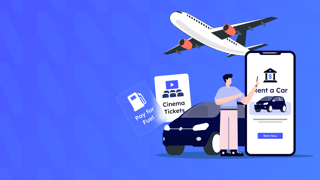Beyond banking: Can bank apps boost engagement by going the extra mile

Would you buy cinema tickets, book a hotel room, or get your mobile data plan from your bank?
With competition fiercer than ever, a growing number of banks are going beyond banking — and even beyond banking-adjacent products like insurance — and offering products you wouldn't normally expect from them.
But are these initiatives moving the needle when it comes to boosting loyalty and engagement, or a distraction from what really matters: seamless, personalised, and digital-first banking experiences?
What non-banking services are banks offering?
Out of the banks and fintechs on our digital banking research platform FinTech Insights, 43 offer at least one non-banking functionality on iOS. These can be grouped into five broad categories:
-
Transport
Rent a car or bike, apply for or manage a lease, apply for a vehicle registration plate, get roadside assistance, pay for fuel, pay a parking ticket, order a toll pass, buy or top up a travel (public transport) pass.
- Travel
Airport lounge passes, hotel bookings, travel or entertainment arrangements, and travel tips and recommendations.
- Entertainment
Buy cinema tickets, buy amusement park tickets, and receive football match alerts.
- Jobs
Browse vacancies and create alerts for relevant postings.
- Miscellaneous
Buy a mobile data plan, get help finding which government benefits you're entitled to, access online stores from within the banking app and pay in installments or cash.

The three non-banking functionalities offered by the largest number of firms in our sample are: top up a travel pass, book a hotel room, and access an online store via the banking app. Each is offered by 9 out of 43 — around 21% of the sample.
Some firms' choices seem intentional and strategic. For example, by offering book a flight, book a hotel room, and rent-a-car functionality, SoFi has put together a "travel package."
Another interesting finding is that the most popular feature in Latin America is topping up a travel pass. Public transport use is relatively high compared to other parts of the world, with a penetration of 60.1% in 2025 according to Statista. So this could explain why the region's firms have focused on this feature.
Nubank — the region's largest challenger — and Revolut, which launched in Latin America in 2023, also enable their users to buy mobile data plans.

Topping up your mobile credit from your banking app isn't a new concept. But Nubank and Revolut take this a step further, because the customer doesn't need a SIM card. They can buy an eSim from within the app. More evidence these two challengers are going head-to-head?
What banking customers want: are non-banking features filling a need or falling flat?
So why are banks expanding into areas that aren't strictly related to banking?
Embedded finance, which enables non-banks to offer banking products, might offer a partial explanation.
The market will be worth around $834.1 billion by 2034. This exponential growth means that, alongside direct competitors, banks increasingly face competition from transport operators, online retailers, Big Tech, and other sectors they've never had to fear before.
Could it be that, by expanding into non-banking, banks are doing the same in reverse?
While the strategy has its benefits, namely more data for personalization, customers must want to buy these products from their banks for these benefits to materialize.
According to a 2023 Société Générale report, retailers offering embedded finance products see up to 30% higher conversion rates and 50% higher average sales. But, absent studies specific to banking, it remains to be seen whether the strategy works the other way round: that is, for banks offering non-banking services.
Another possibility is the trend toward super-apps: apps that bundle financial services, e-commerce, social networking and more, in the vein of Chinese apps like WeChat and Alipay by Ant Group.
Nubank and Revolut are moving in this direction, and X (formerly Twitter) has expressed similar ambitions. Could incumbent banks be following suit?
“If I'd asked people what they wanted, they would've said faster horses.”
This quote, attributed to Henry Ford, is as relevant as ever in the digital age.
With customers ever more knowledgeable, empowered, and spoilt for choice, brands must go the extra mile to secure their loyalty. More and more often, this comes in the form of not just meeting, but anticipating their needs.
So where does this leave banks? Are non-banking features worth doubling down on?
At the risk of sounding like we're dodging the question, it depends.
At the end of the day, it's not whether banks offer these features that counts, but how easy they are to access and use, and whether they improve consumers' lives.
More importantly, no amount of bells and whistles can make up for fundamental issues. First things first, banks must get their digital banking offering right. Only then can they afford to spend time, effort, and resources honing other capabilities.
What to find out how your digital banking offering compares to the rest of your market?
You may also like
October 10, 2024
December 10, 2024
September 6, 2024

Build a digital banking strategy that can't be challenged
Let's show you how FinTech Insights can help you wow your customers, on every login.